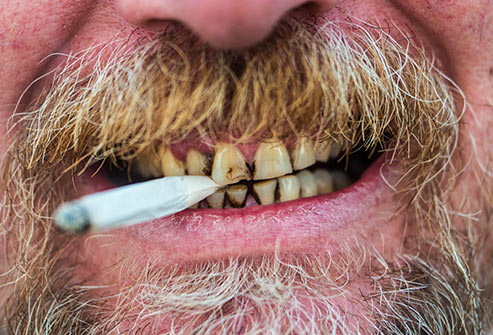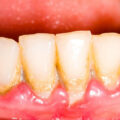According to the CDC Smoking is an important cause of severe gum disease in the United States. Gum disease starts with bacteria (germs) on your teeth that get under your gums. If the germs stay on your teeth for too long, layers of plaque (film) and tartar (hardened plaque) develop.
When gum disease gets worse, your gums can pull away from your teeth and form spaces that get infected. This is severe gum disease, also called periodontitis. The bone and tissue that hold your teeth in place can break down, and your teeth may loosen and need to be pulled out.
How Is Smoking Related to Gum Disease?
Smoking weakens your body’s infection fighters (your immune system). This makes it harder to fight off a gum infection. Once you have gum damage, smoking also makes it harder for your gums to heal.
How Smoking Affects Your Teeth and Oral Cavity
The number of ways that smoking can affect your oral health is not a small list. It’s a solemn one. If you’re a smoker, parts of this list are obvious — but most are alarming.
Stained Teeth, Bad Breath, Loss of Smell & Taste: Smoking can singe your sense of smell and taste, while cigarette tar can stain your teeth, discolor your tongue, and lead to halitosis.
Weakened Immune System: Smokers’ immune systems become compromised, leading to weakened defenses against oral diseases and longer recovery from dental surgical procedures.
Gum and Periodontal Disease: You are twice as likely to experience gum disease if you smoke, notes the Centers for Disease Control.
Tooth Decay & Loss: Smoking supports bacteria, plaque, and tartar build-up leading to cavities, decay, and tooth loss.
Mouth Sores & Ulcers: These common oral health issues are much more prevalent in smokers.
Gum Recession: Smokers who develop gum disease experience receding gums that exposes the margins of their crowns. This may make oral hygiene more difficult and change the aesthetic appearance of their crowns.
Oral Cancer: Exposure to harmful chemicals found in cigarettes, cigars, and smokeless tobacco causes mutations in the healthy cells of your mouth and throat, increasing your risk for developing oral cancer — probably the most serious and challenging to treat.
Here are some other health consequences of smoking you might not have heard before…
- Going Blind
Smoking doesn’t do your peepers any good. Smoking increases your risk of age-related macular degeneration, the leading cause of blindness in adults over the age of 65.
- Type 2 Diabetes
Smoking contributes to type 2 diabetes and increases the risk of complications from the disease— including poor blood flow to legs and feet. This can lead to infection and result in the need to amputate a limb. Yep–you could lose your foot or leg!
- Erectile Dysfunction
Male sexual function is affected when you smoke. Tobacco causes narrowing of blood vessels all over your body, including those that supply blood to the penis. Good news is that quitting will make a big difference.
- Ectopic Pregnancy
Ectopic pregnancy is a life-threatening reproductive complication in women that is more likely in smokers. It occurs when a fertilized egg implants somewhere other than the uterus. The egg can’t survive and it puts mom’s life at serious risk.
- Hip Fractures
Smokers lose bone density at a faster rate than non-smokers which puts you at risk for breaking body parts like your hip. Putting down the cigarettes can help slow down this process and keep you breaking a sweat, not your bones, on the dance floor.
- Colorectal Cancer
Colorectal cancer, which forms in your intestines (colon or rectum), is the second leading cause of cancer deaths in the United States. One of the reasons? Yup, cigarette smoking. Smoking is linked to an increased risk of developing and dying from this type of cancer.
- Rheumatoid Arthritis
Rheumatoid arthritis is a chronic inflammatory disease more common in women that affects the joints in your hands and feet. It causes painful swelling that can eventually result in bone loss and joint deformity. Smoking is one of the causes, and is also associated with developing the disease at an earlier age.
- Cleft Lip and Cleft Palate
These birth defects, commonly called orofacial clefts, occur when a baby’s lip or mouth doesn’t develop properly during pregnancy. Women who smoke during pregnancy are more likely to have babies with orofacial clefts.
- Fertility Issues
Moms-to-be take note: Smoking can affect your ability to conceive. It causes reduced fertility in women and can contribute to other problems during pregnancy. READ:How Does Smoking Affect Your Brain






